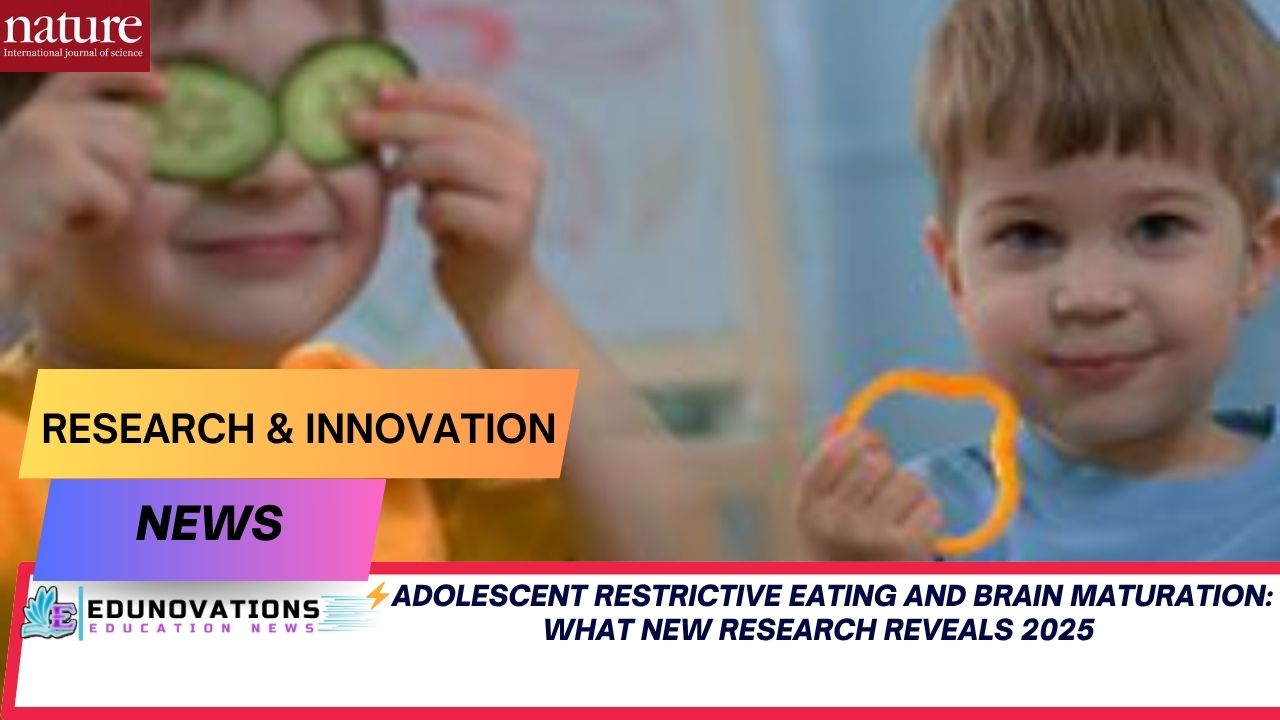Adolescent Restrictive Eating and Brain Maturation
Discover how adolescent restrictive eating influences brain maturation, emotional eating, and obesity risks in light of new research findings.
Adolescence marks a critical phase of development—not just physically and emotionally, but also neurologically. A new study has brought to light a compelling association: adolescent restrictive eating brain maturation patterns are significantly influenced by underlying brain structure and genetic predispositions, raising important concerns about mental health trajectories and long-term eating behaviors.
This research presents not only scientific insights but also crucial implications for public health, family education, and adolescent care strategies.
Understanding Eating Behavior Profiles in Adolescents
Through longitudinal observations involving over 4,500 adolescents, scientists identified three distinct eating behavior profiles:
- Healthy Eating Pattern
- Emotional/Uncontrolled Eating
- Restrictive Eating
While the adolescent restrictive eating brain maturation connection is the central finding, the study also explores how other profiles—especially emotional eating—correlate with genetic, emotional, and neurobiological changes.
The implications are vast: from public health policies to psychological support systems, these eating patterns offer clues to future behavioral and physiological health issues.
Cerebellum Volume and Brain Structure: The Silent Players
A key finding of the research is the association between the cerebellum and eating behaviors. Adolescents with restrictive eating patterns exhibited delayed cerebellum volume maturation. Since the cerebellum is involved not just in motor control but also cognitive processes, this delay could impact decision-making, self-regulation, and emotional control.
Furthermore, the research establishes that emotion eating obesity genetic risk teens is not merely behavioral. Brain regions associated with reward, stress response, and decision-making were structurally different in teens exhibiting emotional or uncontrolled eating patterns.
Genetic Risk and BMI Polygenic Scores
The researchers also evaluated polygenic scores (PGS) for body mass index (BMI). These scores help predict genetic predisposition to weight gain. Notably, the cerebellum volume BMI gene link eating relationship emerged prominently.
Teens with higher BMI-PGS scores tended to display both emotional and restrictive eating behaviors. These findings highlight a profound genetic-biological basis for what often appears to be “lifestyle choices.”
This reveals that longitudinal adolescent eating behavior study is not just necessary, but crucial in decoding these overlapping biological and psychological risk factors.
Externalizing and Internalizing Problems: A Psychological Lens
One of the more significant takeaways was the correlation between externalizing problems and uncontrolled eating. Teens who displayed behaviors like impulsivity, aggression, or lack of discipline were more prone to emotional and uncontrolled eating.
In contrast, internalizing issues such as anxiety and depression showed a stronger association with restrictive eating patterns. This ties directly to the earlier cerebellar development issues and shows the need for early interventions.
Implications for Parents, Schools, and Policymakers
This research should serve as a wake-up call. The intersection of brain science, psychology, and genetics demonstrates that adolescent eating behaviors are not simply a result of poor choices or peer pressure. Instead, they may be deeply rooted in biological and neurodevelopmental pathways.
For teachers and parents, awareness is key. Educators might consider integrating mental health and nutrition topics into curriculum. For students, access to engaging and trusted educational platforms like NCERT Courses or Current Affairs ensures better understanding of these challenges.
Policymakers must also take note. There’s an urgent need to screen students not just for weight, but also for underlying behavioral patterns and emotional stressors.
Expert Opinions: What the Community Says
Dr. Susan Tapert, a leading adolescent neuroscientist from the University of California, comments:
“The findings provide crucial evidence that early interventions addressing emotional dysregulation could help prevent long-term eating disorders and associated metabolic conditions.”
Her insights add weight to the idea that emotion eating obesity genetic risk teens should be treated proactively.
How Schools Can Help
Digital intervention and early awareness can mitigate future risks. Schools looking to improve their health infrastructure and digital reach can explore website development services to better deliver e-learning content and digital resources to students.
Additionally, integrating platforms for Notes, MCQ’s, and Videos can help educate adolescents in an engaging, inclusive format.
Toppers Use Mind Maps to score more than 95%
NCERT Class 11th Commerce Mind Maps
Add to cartOriginal price was: ₹999.00.₹199.00Current price is: ₹199.00.NCERT Class 12th Chemistry Mind Maps
Add to cartOriginal price was: ₹199.00.₹75.00Current price is: ₹75.00.NCERT Class 12th Commerce Mind Maps
Add to cartOriginal price was: ₹999.00.₹199.00Current price is: ₹199.00.NCERT Class 12th Science Mind Maps
Add to cartOriginal price was: ₹999.00.₹199.00Current price is: ₹199.00.NCERT Mind Maps For Class 10th
Add to cartOriginal price was: ₹999.00.₹199.00Current price is: ₹199.00.
Purchase Today
Free NCERT PDFs and Mind Maps for Awareness
Accessible educational content on biology, genetics, and psychology can play a preventive role. Students can download Free NCERT PDFs or review NCERT Mind Maps for visual learning and exam preparation.
Such proactive steps could help teens understand themselves better and resist harmful behaviors shaped by biological or emotional struggles.
Conclusion
The link between adolescent restrictive eating brain maturation and genetic, emotional, and structural brain factors highlights the need for early screening, emotional intelligence training, and neurodevelopmental awareness.
This groundbreaking study sends a powerful message: adolescent eating behaviors are not isolated incidents but intricate expressions of the body’s biology and the brain’s developmental timeline.
By focusing on both the cerebellum volume BMI gene link eating and externalizing problems uncontrolled eating, we can develop holistic programs to nurture healthier, emotionally secure adolescents who grow into resilient adults.
Frequently Asked Questions (FAQs)
1. What is adolescent restrictive eating brain maturation?
It refers to how delayed brain development, especially in the cerebellum, is associated with restrictive eating habits in teenagers.
2. How is emotion eating obesity genetic risk teens evaluated?
This risk is assessed using polygenic scores that predict an individual’s genetic likelihood of becoming overweight and how that risk influences emotional eating.
3. Which brain region is linked to eating behaviors?
The cerebellum plays a crucial role, along with other regions involved in emotion and reward processing.
4. Can brain maturation delay cause restrictive eating?
Yes, delayed development in specific brain areas like the cerebellum can impair decision-making and self-control, leading to restrictive eating.
5. What does cerebellum volume BMI gene link eating mean?
It suggests that teens with certain genetic markers for high BMI also show delayed cerebellar development, influencing their eating habits.
6. Are externalizing problems uncontrolled eating related?
Yes, teens displaying impulsive or aggressive behavior are more likely to engage in uncontrolled eating.
7. How do internalizing issues affect eating behaviors?
Internalizing issues such as anxiety or depression are more often associated with restrictive or emotional eating patterns.
8. Why are longitudinal adolescent eating behavior study important?
They help track how brain development and genetics influence eating behaviors over time, offering insights for early intervention.
9. Can educational resources help prevent disordered eating?
Yes, accessible platforms like Syllabus and Downloads support awareness and education.
10. How can schools support teen mental health and eating behaviors?
By implementing mental health programs, digital education resources, and websites built by Mart Ind Infotech, schools can play a proactive role.
Cite this article
Yu, X., Zhang, Z., Herle, M. et al. Relationships of eating behaviors with psychopathology, brain maturation and genetic risk for obesity in an adolescent cohort study. Nat. Mental Health 3, 58–70 (2025). https://doi.org/10.1038/s44220-024-00354-7














